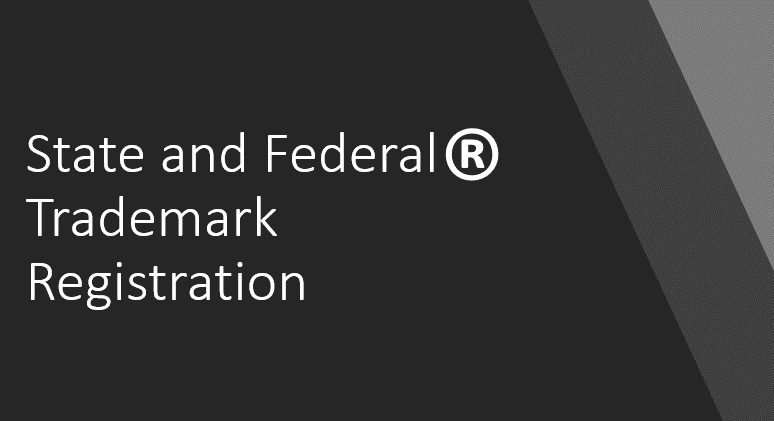
Trademark rights vest by virtue of properly using a trademark in commerce in association with a good or a service. Many people do not realize it, but you do not have to register your trademark in order to gain enforceable rights. By virtue of using your trademark in commerce you obtain common law trademark rights. Common law trademark rights are protected by state common law of unfair competition and U.S. trademark infringement under the Lanham Act. Your common law rights will be limited to the general geographic territory in which you are using your trademark at the time of the infringement.
You can also register your trademark with the United States Patent and Trademark Office (USPTO) or you can register your trademark in your state or another state in which you are offering your products or services.
While many people and companies go straight to Federal registration for protecting their trademarks, there are times when registering a trademark with the state trademark office is more appropriate.
Registering a Trademark With a State Trademark Office
The most obvious reason to register a trademark with the state trademark office is when your use of the trademark does not qualify for Federal registration. For example, if you only use your mark within the boundary of your state and not in interstate commerce, you may not qualify for Federal registration, but you still qualify for state registration. Registration with the state will vest in you the right to exclusive use of that mark in association with the registered goods and services throughout the state.
Most states require use of the trademark within their state before registering the trademark with the state trademark office. This can be counterintuitive, but makes sense when you realize trademark rights vest based on actual use of the trademark in the normal course of business. This is different from Federal trademark registration where an applicant is permitted to file a placeholder “Intent to use” trademark application. and also where it must be shown (sooner or later) that the mark has been used “in commerce”, i.e., in a type of commerce that Congress may regulate.
Registration of a trademark with your state typically only costs $50-$100 for the state registration fee, plus attorney time. Also, the trademark process is fairly simple and you often only need to identify the general class of goods or service in which you want to register the mark. Generally speaking, because there are considerably fewer registrations at the state level, there is less likelihood of a refusal based on a prior filed or registered mark at the state level as well.
You may also want to register a trademark with your state trademark office when the goods or services with which the mark is used are not legal at the Federal level. For example, consider a Federally controlled substance that is illegal at the Federal level but permitted at the state level, such a THC. In that instance, registration with the state trademark office will provide enforceable trademark rights that vest throughout your state. Registration with the state trademark office also allows the trademark registrant to claim exclusive use of the mark throughout the state in association with the same or similar goods or services.
Registering a Trademark with The United States Patent and Trademark Office
If you are offering or plan to offer your goods or services in commerce ( which includes, among other things, advertising and selling beyond your state’s boundaries or abroad), and your goods and services are legal to offer or sell under Federal law, Federal registration of trademarks is highly recommended. Owning a federal trademark registration on the Principal Register provides a number of advantages, including: 1) a legal presumption of ownership of the mark; 2) nationwide coverage, i.e., an exclusive right to use the mark nationwide in connection with the goods/services listed in the registration; 3) public notice of your claim of ownership of the mark; 4) the right to use the federal registration symbol®; 5) the ability to bring an action concerning the mark in federal court where such action covers the entire United States, 6) the use of the U.S. registration as a basis to obtain registration in foreign countries and as a basis for having U.S. Customs stop the importation of counterfeit goods, 7) an ability in effect to “reserve” your mark in advance of actually starting to use it in commerce, and 8) meeting the requirements of some online retailers when asking them to take down or take action against another user’s posting that infringes a trademark. If you are interested in seeking federal or state registration of a trademark, give us a call for a free consultation at (503) 439-6500. Ted D. Karr, P.C., Partner, Berkeley Law & Technology Group, LLP. TM@bltg-ip.com
